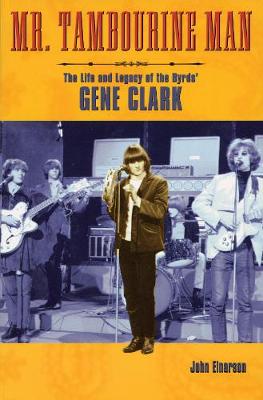 A few months back we looked at David N Meyer’s book on Gram Parsons. That book spent much of its time stripping away the myths that have followed Parsons’ name. Einarson has a different task with his ex-Byrd biography. Taking a man whose flaws are well known, and largely limited his career, and showing the musician and writer behind the problems.
A few months back we looked at David N Meyer’s book on Gram Parsons. That book spent much of its time stripping away the myths that have followed Parsons’ name. Einarson has a different task with his ex-Byrd biography. Taking a man whose flaws are well known, and largely limited his career, and showing the musician and writer behind the problems.
Chris Hillman, always a perceptive interviewee, talked extensively for this book. He sums up Clark’s lack of success after The Byrds as an inability or unwillingness to allow himself to be groomed by record companies and management as a solo star, and a failure to appear on stage effectively. This is said in connection with a 1968 residency at the Whisky in LA, backed by Clarence White and John York in support of his early solo work for Columbia, it could just as well have been said about his late ’70s reunion with Hillman and Roger McGuinn. Road Manager Al Hersh describes the fights and arguments that accompanied that tour, between all three parties, but usually because of Clark’s being “so out of it”. Watching videos of McGuinn, Clark and Hillman, the best you can say about Gene’s performances is that they are disconnected from his bandmates.
Einarson paints a vivid picture of the frustrations of musicians, those tasked with guiding his career, and especially his family. Teasing out his complex relationships with his sons, partners, and others is one where this book scores best. It shows a man, who in the words of his elder son Kelly, “just wanted to be a normal guy”. Wife and mother of his sons, Carlie, agrees suggesting that Gene was never happier than when they lived on an apple farm near Mendocino. Second son Kai, a singer-songwriter himself whose 2020 tribute to his father ‘Silver Raven’ deservedly scored 9 out of 10 in our review, suggests his father was scared of fame, and never got over the adulation of the early days of the Byrds. Kai believes that songwriting was his father’s true calling and that performing was a distraction.
The “circus” surrounding Gene Clark’s death seems as bizarre as that which accompanied Gram Parsons’ passing. The cast includes an ex-partner grabbing music and valuables while his body went unattended. Her subsequent fight for control of the estate, ultimately losing out to Clark’s sons, and some strange scenes at Clark’s funeral, involving his actor friend David Carradine. Unlike Parsons, it’s doubtful if there will ever be a biopic of his life and passing. Which leaves the music. And that is where the focus remains.
Collaborator Carla Olson is among many who recall fondly the process of working with Clark when he was at his best. For Byrds fans the description of abortive sessions for a band to be called Flyte made up of ex-members from across the whole history of the group is interesting. Pedal Steel player Al Perkins recalls Gene as being on his “best behaviour”. With Hillman in charge, a 2-night engagement took the music towards acoustic bluegrass and “was headed in a different direction” to Clark. The ‘Firebyrd‘ album that was being recorded at the same time in 1982 was probably Clark’s last best hope at real commercial success. Its failure to connect did however bring him into the orbit of Olson and her manager Saul Davis. Einarson seems to feel that this was another happy period of Clark’s career, taking him into an acoustic roots direction. Once again bad business decisions, in this case a 20th anniversary tribute to The Byrds with Michael Clarke, derailed this promising new track. It seems however far he travelled, The Byrds were always there to haunt him.
Typing “Gene Clark” into the AUK search bar finds 2 classic albums, (‘No Other’ and ‘Firebyrd’), and appearances in our ‘Essentials’ and ‘A-Z of Americana’ strands, along with several video selections. Comparing that with the relative lack of material with the, supposedly, more influential Gram Parsons in our pages, you have to conclude that long term the influence of Gene Clark and the quality of his music has stood the test of time a little better. And John Einarson has given us the definitive guide to why Gene Clark still matters.
With Carla Olson on one of his best songs from ‘So Rebellious a Lover’:
A solo version of the Byrds classic:



Great review and shout-out for a definitive view of Gene Clark. John Einarson’s “Desperados: The Roots Of Country Rock” is also a good read.
Blowing my own trumpet here but still chuffed to mentioned in the acknowledgments after corresponding with Einarson and sending him scans of Clark articles from some UK fanzines. And of course, it’s an essential read.
I got to see Parsons in the 80’s? But his work with Carla Olson was under appreciated. Sad what booze and drugs can do to a soul.